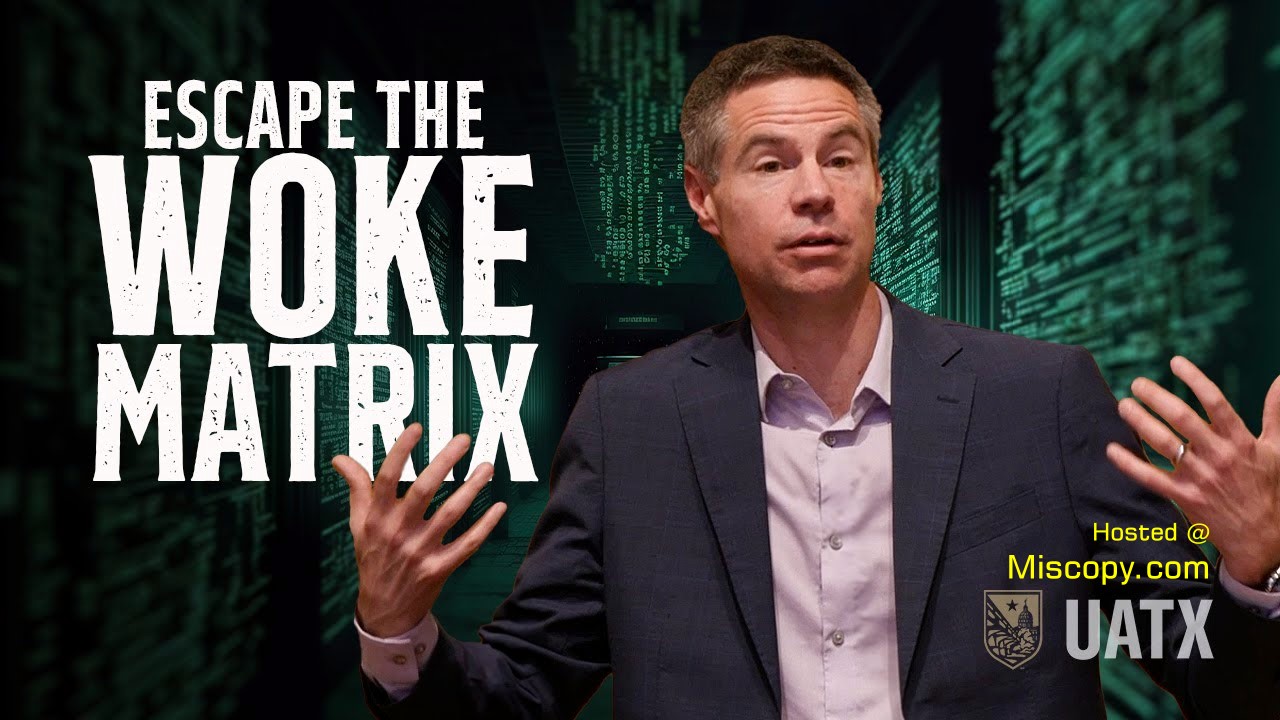In this video, Michael Shellenberger discusses the dangers of censorship and the rewriting of history, highlighting his own experiences as a journalist and author. He addresses topics such as police killings, disinformation campaigns, and censorship during the pandemic. He also delves into the concept of the “woke matrix,” propaganda, and the rise of cancel culture.
The speaker explores the implications of denying the existence of God and the moral hierarchy based on race. He raises questions about mask-wearing and the behavior of individuals in positions of power. The importance of free speech, equal justice, and meritocracy is emphasized, along with the need to address psychopathic and narcissistic tendencies in leaders.
The speaker encourages critical analysis of information and the pursuit of truth, while advocating for access to clean energy and debunking misinformation on climate change. They stress the importance of patriotism, love for humanity, and positive change through journalism and new institutions. The talk concludes with a discussion on environmental stewardship and the role of climate change narratives in censorship and control.
Escape the Woke Matrix
In the beginning of the video Michael Shellenberger discusses the importance of understanding history and the dangers of censorship. He highlights how censorship rewrites history to benefit the powerful and harm the people. He also talks about his own work as a journalist and author, including uncovering the FBI and intelligence community’s efforts to discredit factual information about Hunter Biden’s foreign business dealings. Shellenberger addresses the issue of domestic censorship and disinformation campaigns supported by the U.S. government. He then introduces his lecture titled “Escape the Woke Matrix” and questions the prevailing narratives surrounding climate change and social issues.
Michael Shellenberger then discusses the decline in police killings of African-Americans over the years, citing data from Roland Friar at Harvard University. He explains that police killings of African-Americans decreased from 217 per year in the 1970s to 157 per year in the 2010s. Furthermore, he highlights that police killings of all races have dramatically declined, from 59 per year between 1970-1975 to 12 per year. Shellenberger also mentions that researchers do not have enough data to determine if trans people are being killed disproportionately or if trans homicides are rising. He criticizes news outlets for irresponsibly suggesting otherwise. Shellenberger then goes on to discuss various instances of disinformation campaigns, such as the FBI investigation based on a made-up memo about Trump and the lab leak theory of COVID-19. He emphasizes the need for accurate information and highlights the role of senior government officials in perpetuating disinformation campaigns.
When discussing various examples of censorship and suppression of information related to the pandemic, v mentions how the Washington Post and Fauci were involved in spreading disinformation, and how a fake science article was published to support conspiracy theories. Shellenberger also talks about the Great Barrington declaration, which proposed a focused protection approach to the pandemic, and how it was met with criticism and attempts to discredit it. He criticizes individuals like Renee DiResta, who ran a censorship operation using taxpayer dollars, and mentions social media platforms like Twitter and Facebook censoring posts related to election questioning and vaccine side effects. Shellenberger highlights the government’s involvement in demanding censorship, and expresses concern over the violation of the First Amendment.
The speaker also discusses how accurate information was being censored by platforms like Twitter and Facebook because they were concerned that people might make the wrong decisions based on that information. The FBI had reportedly approached these platforms, prompting them to be prepared to censor the Hunter Biden laptop story before it had even been published. The speaker argues that this censorship goes against the principles of journalism and the First Amendment, which protect the public interest and whistleblowers. The speaker also highlights the efforts by the Aspen Institute, funded by the US federal government, to discourage journalists from covering certain stories and focusing instead on the individuals who leaked the information. The speaker contends that these tactics are being used to suppress information and protect “fragile” individuals, under the guise of protecting them from harm.
The speaker further discusses various aspects of the “woke matrix,” including attempts to read encrypted text messages, the creation of tip lines for reporting “wrong think,” and the involvement of figures like Jacinda Ardern in global censorship initiatives. They also explore the censorship industrial complex, which involves organized pressure campaigns and cancellation efforts in various domains. The speaker argues that propaganda plays a role in controlling the information environment and influencing public perception, citing the example of the Hunter Biden laptop story. They suggest that the rise of cancel culture and wokism as predicates for censorship, stems from a lack of traditional moral structures and the need for individuals to find meaning and significance in their lives.
The speaker then discusses the dangers of denying the existence of God, arguing that when people stop believing in God, they end up believing in anything, including things like climate change as a new external authority. He describes how guilt has shifted from religious sins to guilt about using fossil fuels and modern technology. The speaker also addresses the rise of a new moral order based on race, where people are ranked on a moral hierarchy. He criticizes the idea that laws should be enforced differently based on victimhood and argues that it is leading to a new set of witches. The speaker further discusses the influence of social media and the rise of cluster B personality disorders, with individuals adopting victimhood as an identity. He warns about the dangers of entitlement, aggression, and impaired empathy that can arise from perpetuating victimhood as an identity. The speaker concludes by mentioning the infiltration of narcissists and psychopaths in victimhood movements.
The speaker raises questions about the reasoning behind the demand for mask-wearing, particularly in schools, questioning why well-intentioned people would support this. They also touch on the idea that individuals in positions of political power who exhibit psychopathic behavior can create an epidemic of psychopathology, and that people who are not inherently psychopathic can, under certain circumstances, behave like psychopaths. The speaker warns against creating a culture of cluster B personality disorders and highlights the potential for aggression and violence within grievance-based movements. They emphasize the importance of free speech but also acknowledge the need for equal justice under the law, meritocracy, affordable energy, and freedom of speech as essential components of a liberal democracy. Lastly, they discuss the need to address and remove individuals with psychopathic and narcissistic tendencies from positions of power and authority.
The speaker emphasizes the importance of not becoming like the monsters we confront and the challenge of loving our enemies. He also discusses the need to debunk false narratives and misinformation, particularly when it comes to the perception of increasing hatred. By examining the data, he suggests that there is actually less hatred among racial, religious, and sexual minorities today compared to any other time in recorded history. He encourages individuals to critically analyze information, debunk false claims, and seek truth in order to maintain a sense of bravery and overcome victimization. The speaker also criticizes the New York Times and Financial Times for their biased reporting and emphasizes the importance of seeking status and recognition for the right reasons, such as courage, acuity, and compassion.
Michael Shellenberger then discusses the misrepresentation of data on hurricanes and the importance of providing access to clean energy for people in the third world. He points out that satellite technology has greatly improved hurricane detection and refutes the claim that there has been an increase in hurricanes over the last century. He argues that denying access to natural gas and liquefied petroleum gas for sub-Saharan Africans and South Asians is morally wrong, as it prevents them from escaping poverty and significantly impacts their quality of life. Shellenberger emphasizes that cheap energy is crucial for women’s liberation and highlights the potential for global poverty eradication and wildlife conservation. He concludes by urging everyone to fight for this future and expresses his gratitude to the audience.
When discussing the importance of patriotism and love for humanity, Michael Shellenberger acknowledges that there are negative aspects of the country but emphasizes the uniqueness and tolerance of America. Shellenberger believes that building a positive future involves addressing issues such as climate change and solving environmental problems, advocating for the use of gas and nuclear energy to lift people out of poverty. He criticizes censorship, fake hate crises, and the need to be policed by authorities. When asked about the connection between the decline of Christianity and the rise of wokism, Shellenberger agrees that people may turn to new ideologies to find meaning in their lives. He highlights the need for consistent reinvention and the potential for journalism, public intellectual life, and new institutions like the University of Austin to bring about positive change. Shellenberger encourages people to confront darkness, let go of unhealthy relationships and toxic institutions, and find freedom in expressing their beliefs.
Michael Shellenberger then highlights two important ways to be better environmental stewards. Firstly, he emphasizes the importance of not throwing plastic waste into the recycling bin, as plastic recycling is largely ineffective and often ends up polluting rivers and oceans. Secondly, he advocates for nuclear power as a solution to climate change, debunking common misconceptions and emphasizing the need for a change in attitudes towards nuclear energy. Shellenberger also discusses how certain personality types, such as narcissists and psychopaths, have taken over institutions and organizations, using their charisma and spellbinding tactics. He argues that the decline of patriotism has led to the rise of a new, base morality enforced through bullying. Lastly, he mentions that red flags arise when news promoting increasing hatred contradicts the overall trend of declining violence and societal hatred.
Michael Shellenberger also discusses how the narrative of climate change is often used as a tool for censorship and control. He highlights the consequences of climate action, such as depriving developing regions like sub-Saharan Africa of the natural gas they produce, which is vital for fertilizer and food production. Shellenberger suggests that the motivations behind these actions may be driven by a desire for power and control rather than genuine concern for the environment. He also mentions the importance of debunking false narratives and engaging in discussions with woke individuals, emphasizing the need to understand various factors like psychopathy and narcissism on a spectrum rather than being dismissive. Additionally, he shares his satisfaction in debunking the notion of an increase in hate and racism through evidence-based arguments, stating that it has had a positive impact in challenging these claims. Finally, he briefly acknowledges the issue of corporate power and money but does not elaborate further on it in his talk.
In the end, Michael Shellenberger discusses the connection between the news media, corporations, and financial institutions in the context of the attention economy. He explains that the news media’s main interest is to capture your attention so they can sell it to advertisers. While moving towards subscriber-based media may be a partial remedy, it is important to be aware that the business model may not change anytime soon. Shellenberger also points out that there is a demand for debunking, as people find it exciting to see conventional wisdom challenged. He believes that the attention economy doesn’t have to be a bad thing, just like capitalism doesn’t necessarily have negative implications. However, he does acknowledge the issue of pathogenicism and the takeover of institutions by individuals with extreme ideas. Overall, Shellenberger emphasizes the complexity of these interconnected systems and the need for a balanced approach that includes the positive role of government.


